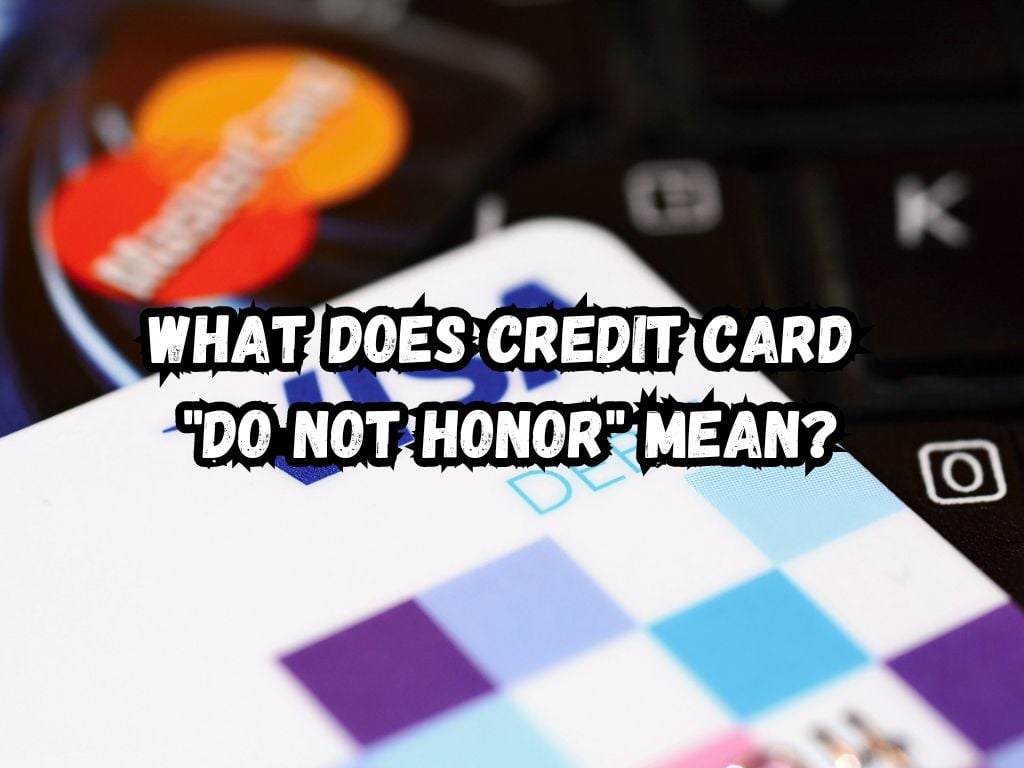Credit cards are the lifeline of modern commerce, enabling purchases with a simple swipe or click.
However, this seamless financial mechanism sometimes encounters disruptions, notably the perplexing and inconvenient “Do Not Honor” error.
This detailed guide delves into what does credit card do not honor mean, offering insights and actionable strategies for cardholders and merchants alike to address and overcome these hurdles.
Understanding “Do Not Honor” Declines
The Nature of “Do Not Honor”
A “Do Not Honor” decline is a financial stop sign issued by a cardholder’s bank, refusing to process a transaction request.
This generic refusal often leaves more questions than answers, prompting a need for further investigation.
The Ambiguity of the Decline
Given its broad nature, the “Do Not Honor” message serves as an initial alert that a problem exists with the transaction, without specifying the cause.
This ambiguity necessitates a closer look into the possible underlying issues.

What Does Credit Card Do Not Honor Mean?
The reasons behind a “Do Not Honor” decline are varied, encompassing everything from simple oversights to complex security measures.
Insufficient Funds
A classic reason for declined transactions is insufficient account balance, a straightforward yet common occurrence.
Uncharacteristic Transactions
Banks diligently monitor for transactions that deviate from a cardholder’s usual spending patterns, flagging any that seem out of place.
Surpassing Credit Limits
Credit limits are in place for a reason, and attempts to exceed them will invariably result in transaction declines.
Input Errors
Human error, such as entering incorrect card details, is a frequent cause of transaction issues.
Card Validity
Transactions attempted with expired or outdated card details will not be processed, a simple issue often overlooked.
Aggressive Fraud Prevention
Banks’ fraud detection measures, while essential for security, can sometimes be overzealous, mistakenly labeling legitimate transactions as fraudulent.
Road to Resolution
For Individuals
Engaging with the Bank
Direct communication with the card-issuing bank remains the most reliable method to uncover and address the specific cause behind a “Do Not Honor” decline.
Transaction Review
Ensuring the transaction amount is correct and within the bounds of the account balance can eliminate one potential cause of declines.
Detail Accuracy
Re-examination of the entered card details for accuracy is a simple yet crucial step in resolving transaction issues.
A Moment of Patience
Sometimes, waiting a short period before retrying the transaction allows temporary issues, like fraud alerts, to be resolved.
Exploring Alternatives
Switching to an alternative payment method can provide a workaround to complete transactions facing persistent “Do Not Honor” issues.
For Merchants
Prompt Customer Communication
Informing customers of the transaction decline and suggesting they contact their bank can often lead to a swift resolution.
Secure and Up-to-Date Processing
Utilizing modern, secure payment processing solutions can reduce the risk of declines and build customer confidence.
Providing Payment Flexibility
Offering an array of payment options can rescue sales that might otherwise be lost to “Do Not Honor” declines.

Strategic Prevention
Preventative measures can significantly mitigate the occurrence of “Do Not Honor” messages, ensuring smoother transaction processes.
For Cardholders
Keeping personal and card information current with the bank, monitoring account balances closely, and notifying the bank of any significant transactions or travel plans can prevent many common decline triggers.
For Merchants
Employing robust, secure transaction processing technologies, along with educating customers about the potential for payment issues, can optimize the transaction experience and minimize disruptions.
Deep Dive into Bank Protocols
Understanding the rationale behind banks’ actions when issuing “Do Not Honor” responses can empower cardholders and merchants with the knowledge to prevent future occurrences.
Banks operate with a customer-first approach to security, aiming to safeguard personal and financial information from potential fraud.
Their systems analyze transactions in real-time, using algorithms that consider factors like the transaction size, location, and spending frequency. When a transaction doesn’t fit the established pattern, it’s flagged for review or declined outright.
Enhancing Cardholder Awareness
Educating cardholders on the importance of maintaining up-to-date information with their issuing banks and the rationale behind spending limits and security protocols can foster a proactive stance toward managing their accounts.
Awareness can lead to more informed financial behaviors, reducing instances of declines.
Merchants’ Role in Customer Education
Merchants play a crucial role in the ecosystem, acting as the bridge between customers and their transaction desires.
By understanding the common reasons for “Do Not Honor” responses and sharing this knowledge with customers, merchants can alleviate frustrations and reduce friction during the checkout process.
Advanced Solutions and Technologies
In the ever-evolving landscape of digital commerce, adopting advanced payment solutions and technologies can significantly diminish the occurrence of transaction declines.
For Cardholders
Leveraging banking apps and services that offer real-time transaction notifications, spending analysis, and easy communication with banks can enhance control over financial transactions, allowing for immediate action in response to any issues.
For Merchants
Incorporating advanced payment platforms that support a variety of payment methods, from traditional credit cards to digital wallets and beyond, can cater to a broader customer base and reduce the likelihood of payment issues.
Additionally, employing machine learning algorithms can improve the accuracy of fraud detection, reducing unnecessary transaction declines while maintaining high levels of security.
Conclusion
The “Do Not Honor” decline is a multifaceted issue that spans both technical and human elements of the transaction process. By demystifying its causes and exploring both preventative and reactive measures, cardholders and merchants can significantly improve transaction success rates.
Through education, communication, and the adoption of advanced technologies, navigating the “Do Not Honor” challenge can become an opportunity for enhanced financial literacy and operational efficiency, strengthening the foundation of modern commerce.


 Tags:
Tags:










